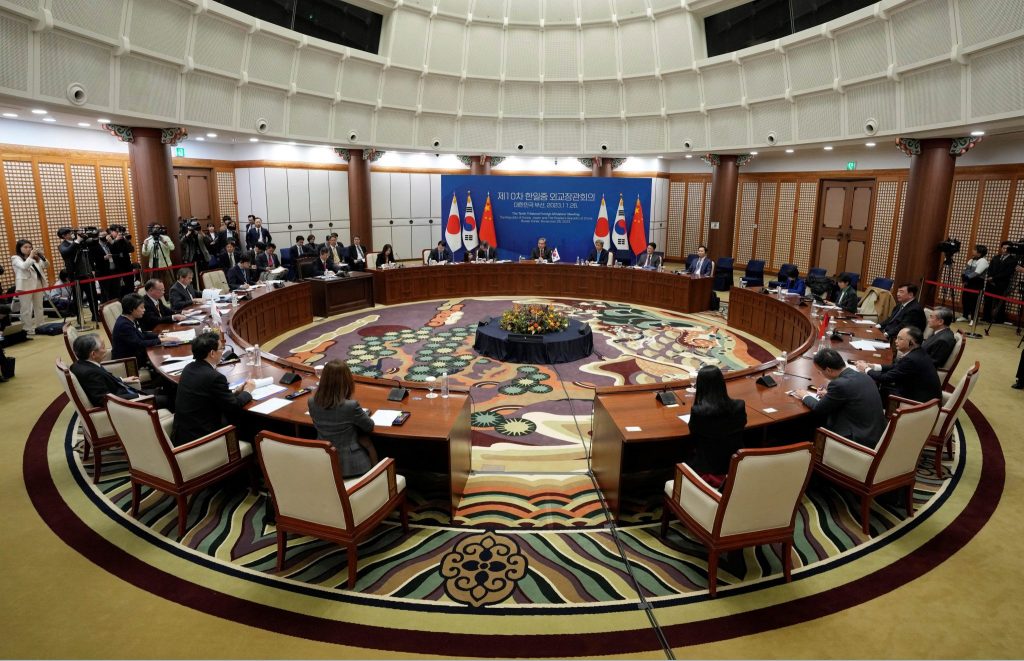The trilateral foreign ministers’ meeting between China, Japan and South Korea (CJK) was held in
Busan, South Korea on 26 November 2023 for the first time since August 2019. Though the meeting
itself is routine and has no immediate impact on regional affairs, the resumption of CJK foreign
ministerial meetings indicates a change in the ‘two-to-one logic’of trilateral relations.
After being postponed due to COVID-19, the Yoon Suk-yeol administration eventually decided to host the CJK meeting amid reconciliation with Tokyo and rapprochement between Washington and Beijing. The shared perception of China as a challenge and the United States’ efforts to reinvigorate the US–Japan–South Korea trilateral defence partnership has solidified the foundation from which Seoul and Tokyo can jointly engage with Beijing in a trilateral format.
This brings the CJK back to its origin — a Japan-led initiative to not only upgrade relations with its neighbours and overcome historical grievances, but also to cooperate with Seoul to promote a free and open international economic system in Asia. Japan and South Korea initiated a joint study of their first bilateral free trade agreement (FTA) in 1998, a year before the first informal CJK trilateral summit held alongside the ASEAN Plus Three summit in 1999. Despite unsuccessful attempts at historical reconciliations over the past two decades, Japan’s efforts culminated in the trilateral investment agreement of 2012.
But during the 2010s, South Korea and China intensified their bilateral cooperation, launching bilateral FTA negotiations in 2012, while Japan–South Korea FTA negotiations froze in 2004. After Shinzo Abe took office in 2012, South Korea and China emphasised a ‘common history’ and jointly criticised Abe as a historical revisionist. During the 2015 CJK summit, then-South Korean president Park Geun-Hye and former Chinese premier Li Keqiang called for ‘the spirit of facing history squarely’ in front of Abe.
During the Park and Moon Jae-in presidencies, Japan also prioritised direct communication with China due to solidified Japan–US relations, rather than jointly working with South Korea vis-a-vis China. Since Abe and Chinese President Xi Jinping broke the ice with a meeting in 2014, Japan and China have maintained communication and agreed on practical areas of cooperation. While Japan advanced an omnidirectional foreign policy across the Indo-Pacific, Europe and even Russia, only Japan–South Korea relations have remained at their lowest ebb.
Now, Japanese Prime Minister Fumio Kishida and South Korean President Yoon Suk-yeol have returned to the original structure of CJK cooperation, where Tokyo and Seoul jointly engage with China. But there has been a significant change in the balance of power between the three countries since the first meeting 25 years ago.
The scale of China’s economy and military dwarf those of Japan and South Korea. Back in 2000, China’s economy was less than one-fourth the size of Japan’s. As of 2022, China’s nominal GDP is $17.9 trillion, about four times that of Japan’s US$4.23 trillion and almost ten times South Korea’s $1.6 trillion. Japan’s military expenditure was double China’s in 2000, but is now less than one-fifth. While South Korea’s military expenditure was the same as China’s during the 1990s, its expenditure is now also just one-fifth of China’s.
This tectonic change has inevitably transformed CJK cooperation. While it was once a framework for Japan and South Korea to engage with China from their economically advantageous positions, this advantage no longer exists. The two-on-one logic is now two small nations facing one behemoth. Now, China sees the shadow of the United States beyond the two nations and must calculate how to incentivise them to diverge from Washington.
The newfound Kishida–Yoon partnership will allow the two countries to jointly engage with China. This time, however, is not for bringing China into the global economy or changing China’s domestic rules and systems. Both countries should stabilise their own bilateral relations with China by anchoring them to the trilateral mechanism to preserve their leverage against China in their respective bilateral negotiations.
Realising this objective requires Japan and South Korea not only to converge their strategic interests and face China together — but also to make their bilateral relations resilient.
Yet Japan–South Korea political relations are far from stable. In November 2023, a Seoul High Court judgement ordered the Government of Japan to pay compensation to the former comfort women. In December 2023, the Supreme Court of Korea ordered several Japanese companies to compensate some of their former wartime Korean employees. The Japanese Foreign Ministry criticised these rulings as violating a 1965 treaty. While public polling data shows that positive views are returning in both states, the Kishida administration has refrained from overreacting — too many unresolved issues can rear their head at any time.
China already tests Japan and South Korea. Chinese Foreign Minister Wang Yi skipped a lunch reception and joint press conference for the 2023 trilateral foreign ministers’ meeting, reflecting China’s
The CJK framework together with the US–Japan–South Korea trilateral summit provides the unique opportunity for Tokyo and Seoul to meet with leaders from both the United States and China every year. No other nations have such an opportunity. Their diplomacy and political leadership will determine whether they can effectively utilise this chance to maintain balanced deterrence and engagement in Northeast Asia.
Ryosuke Hanada is PhD candidate in the Department of Security Studies and Criminology at Macquarie University.

